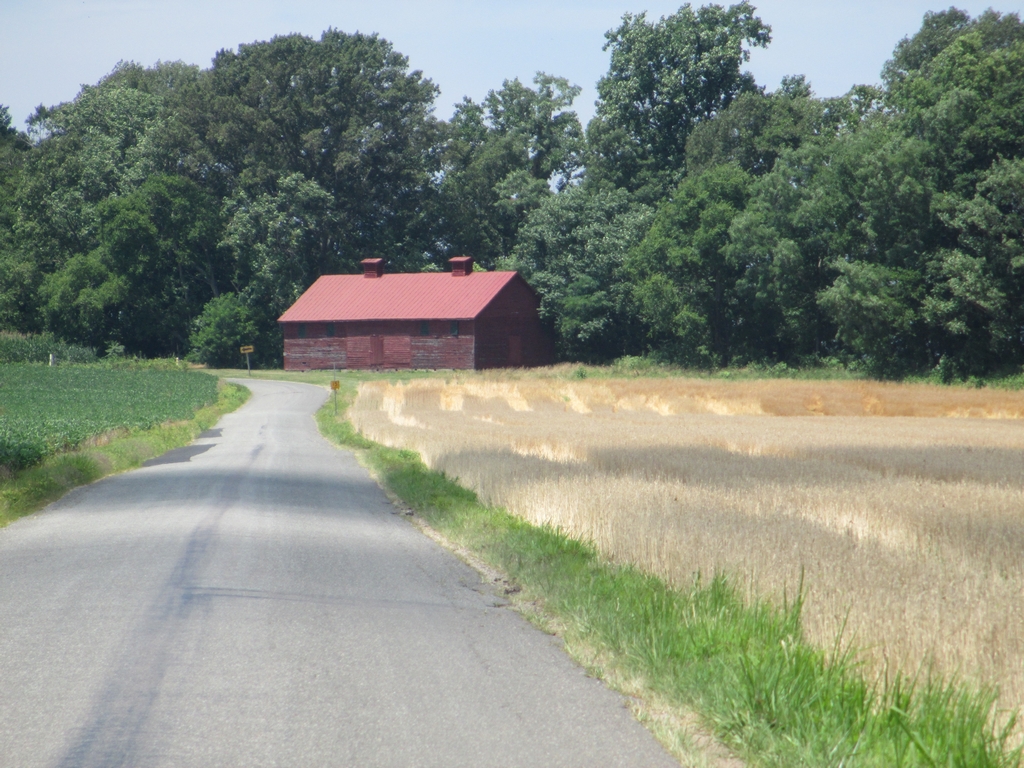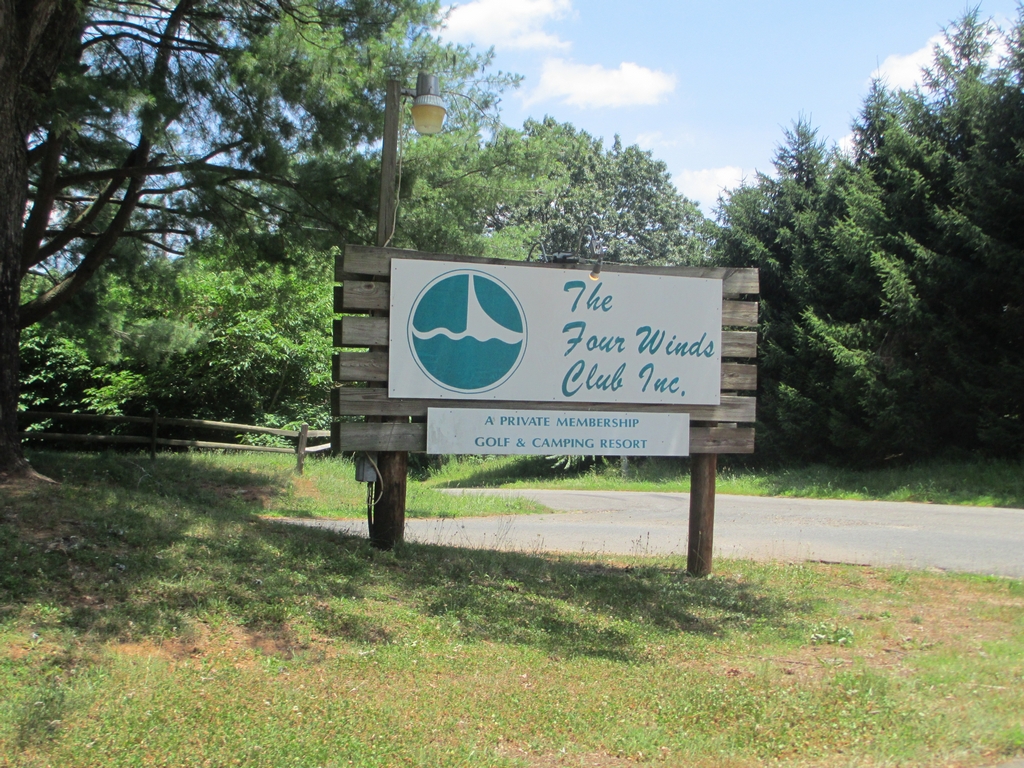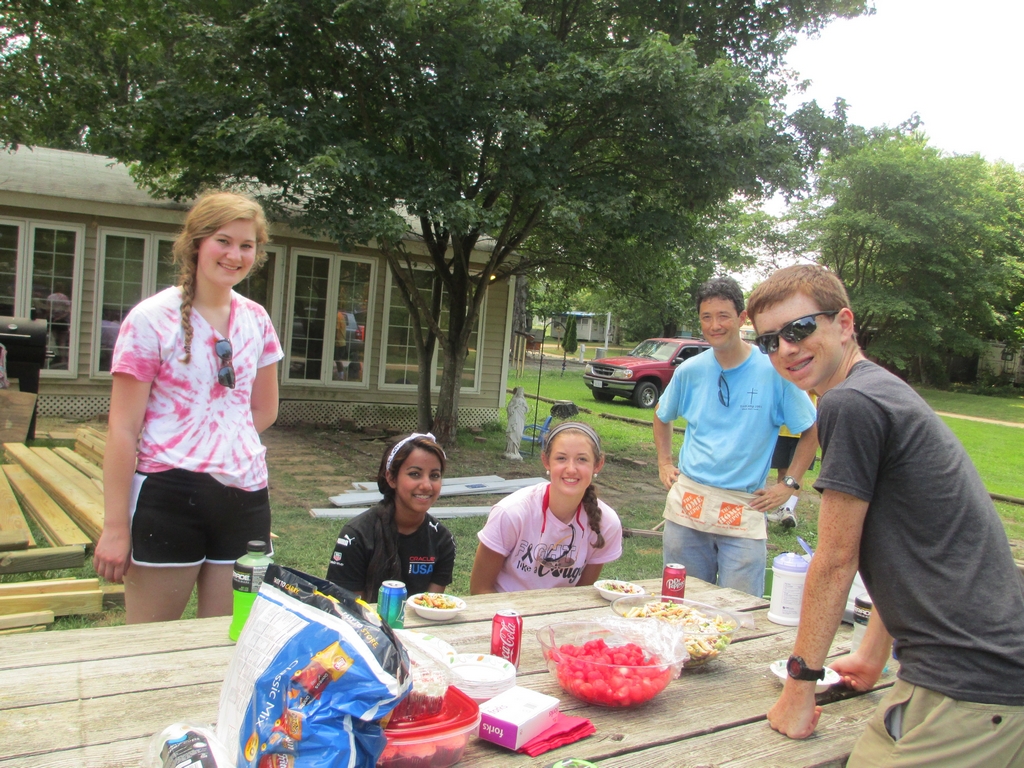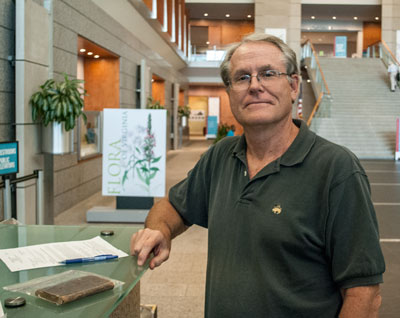
Last Sunday (Pentecost 3, Year A, June 29, 2014)
July 4 – 10am-2pm, Port Royal celebration
July 6 – 10:30am, Holy Eucharist, Rite II, Pentecost 4 at Pitts Pond
July 6 – 11:00am, Morning Prayer, Rite II, Pentecost 4 at St. Peter’s
This Sunday at St. Peter’s – Servers, Readings
Feeding FredCamp this week

The mission –"We exist to bring together youth and adult volunteers for one week each year; together, we live and work together in a Christian community, performing critical home repairs and remodeling for low-income individual and families in Fredericksburg and the counties of Stafford, Spotsylvania, Caroline and King George. "
We have used the support of FredCamp as a substitute for a mission trip.
Thanks to Mary Ann, Catherine, Nancy and Becky for delivering lunches to the FredCamp site in Rappahannock Academy off Route 17, one of ten sites for the program scheduled for the first week in July around July 4. Betty contributed the drinks earlier on Sunday and everyone took some for their day.
The site is about 10 minutes past Route 17 (Ware Creek Road) near the Four Winds Club.


Catherine provided a hearty salad, fruit, a variety of chips, drinks and cupcakes on Tuesday, July 1. Stephen Hu was the adult lead for a a half a dozen FredCampers who were working inside in the very humid conditions of the day.

St. Peter’s Mustard Seed grant in the Virginia Episcopalian summer issue

Here we are on the issue that came out this week ! We received $7,000 and have raised $3,412 of the second $7,000 to match the $14,000 cost . We are almost half way there!
The re-leathering is once a generation—the last time done 31 years ago in 1983. Help preserve the organ for the next generation by donating with “organ bellows in the memo line.
The organ bellows will be sent out on July 8 for repairs. Thanks!
Here is the entire Va. Episcopalian summer issue

St. Peter’s will be involved in several ways:
1. Place of rest during the day in the cool of the church. We have the updated visitors’ brochure, history brochure and the brand new graveyard brochure to read.
2. ECW and others will be providing lunch
3. At 10am we start the date with a couple of slideshows – "Beauty of St. Peter’s, "We do, Life at St. Peter’s" and a new one, "2013."
4. At 11am, Marilyn Newman plays her harp.
5. At 12pm , St. Peter’s will provide a hymn sing with organ concert. Thom Guthrie will do the honors.
6. At 1pm, presentation "St. Peter’s Past and Present"
This is a great event to help promote St. Peter’s! Come help out and come participate.
Here is a photogallery of 2013 .
A New Chapter for Rev. Ware’s Diary
As of June 27, Rev. Ware’s 1893 diary is now in the hands of the Library of Virginia The Vestry considered many locations earlier in 2014 but ultimate chose the Library as the final stop for the library. It helped that it is the depository of many of our early records.
Lyndon H. Hart III, Director, Description Services Branch at the Library of Virginia received the Diary. After hearing about Rev. Ware and the contents, he was pleased that it was donated to the Library.

References to Ware’s diary online
A. The Diary
B. Articles about the Diary
Article 1 Article 2 Article 3
Article 4 Article 5 Article 6
C. Other
Virginia Theological Class of 1878 – two Wares , Sig and brother Jossiah
"Reach out and touch" a Revolutionary War soldier/patriot

There is an old saying that history is written by the victors. Another truism is that it is easy to only concentrate on the leaders of such a cause. In the case of the Revolution, Adams, Jefferson, Hancock, etc. The revolution was a success because of local participation. This includes setting up of state governments, creating resolutions of fundamental freedoms such as religion and the contribution of those who fought on the battlefield and at home. Many who served in the military or served on the homefront are easily forgotten with the absent of newspapers. In the case of Fredericksburg, newspapers appeared after the Revolution.
Fredericksburg contributed to the war over all in munitions cast by Fielding Lewis or the use of the old market square building for housing troops. The Rising Sun Tavern was a place to distribute news and was owned by General Gustavus B. Wallace who served and is buried in the Masonic Cemetery.
Between St. George’s graveyard (1752 or earlier ) and the Masonic graveyard (1784) a block apart, there are at least 6 Revolutionary war graves at St. George’s and 12+ at the Masonic. Several were native born (Barton, Strother, Smith), others were British or foreign born (Rose, Duncanson) . Here are a few details of those at St. George’s so these individuals are not lost to history:
| SURNAME | GIVEN NAME | BIRTH DATE & PLACE | DEATH DATE & PLACE | RANK/TITLE | SERVICE DATA |
|---|---|---|---|---|---|
| BARTON | Seth | 1755 | 1813 | Lieutenant | |
| DUNCANSON | James | 1735 | 1791 | Colonel | |
| FOX | Samuel | 1729 | 13 Mar 1801 | Patriot | Gave material aid to cause |
| ROSE | Alexander | Britain | 28 Nov 1800 Fredericksburg | Major/ Captain | VA. Retired as Major Sept 1778 |
| SMITH | William | 25 May 1746 prob Gloucester England | 7 Oct 1802 Fredericksburg | Patriot | On Committee for Articles of Confederation 1774. Gave beef to cause and use of stable 1781. |
| STROTHER | French | 1733 | 3 Jun 1800 Fredericksburg | Colonel | VA militia, received pension. As patriot gave to the cause in Culpeper Co |
Pictures and more about these men
The Real Purpose of the Declaration

The Declaration of Independence which we will hear, reflect and celebrate on July 4 in Port Royal has been reinterpreted in successive generations. It was first and foremost a document to indicate failure – the petition process of earlier years by the colonists had failed. The King dismissed the colonists well-reasoned arguments attributing them to a few troublemakers. He was convinced in 1775 that the the purpose of the "American rebellion" was for independence right from the beginning. He raised forces, hired foreign troops and had burned American cities (Norfolk) in early 1776 to try to force them back by making them submit.
Garry Willis emphasizes in his book Inventing America that the purpose of the Declaration was not to make the colonies self-governing – they were already acting that way. Congress’ action in 1776 was to acknowledge what had happened, particularly in the debating of independence in key towns of America and the creation of state and local declarations of independence. Many of these particularly in Virginia were stepping stones toward what became state constitutions.
The events of early 1776 led people to see that England had already separated from them. The real motive of Congress and the declaration was a necessary step to secure foreign aid. In that they had to provide a unified stand, difficult with 13 separate colonies. They had to make their cause seem justifiable. In the end they needed that. They wanted to move away from the concept of "rebellion". England would be dealing with a country not a group of rebellious colonies.
Much of the meaning we celebrate in the Declaration is close to Lincoln’s concept of the document – that the statements on equality and rights set a standard of the future – that it was a statement of ideals and goals to be established for the future. The values he emphasized were part of the Revolution generation – equality, human rights, government by consent. He needed to restate those values in a new way to broaden its appeal and to apply it to his time in the midst of the Civil War.
This was best stated in the Gettysburg Address. The Union triumph became the result of the idea that "all men are created equal" and what he called for was the Union complete the "unfinished work" and bring to "this nation, under God, a new birth of freedom."
Religion in the Declaration

"Declaration of Independence" – John Trumbull (1817)
Unlike the United States Constitution, the Declaration makes reference to God. However, that’s about it. The Declaration never mentions Jesus Christ, does not quote the New Testament, and fails to move beyond vague descriptions of God. It is more indicative of a 18th century world view.
There are four references to God either directly or indirectly. A close examination of these references tell us something about the religious world view of its writers.
1. "When in the course of human events, it becomes necessary for one people to dissolve the political bands which have connected them with another, and to assume among the powers of the earth, the separate and equal station to which the Laws and Nature and Nature’s God entitle them, a decent respect to the opinions of mankind required that they should declare the causes which impel them to the separation."
So what is "Nature’s God? David Voelker wrote the following in 1993 before he became a history professor:
"Nature’s God" was clearly the God of deism in all important ways. That Jefferson included God in the "Declaration of Independence" is very significant because it helped lay the foundation for a civil religion in America. Paul Johnson addressed the civil religion begun by the founders in his article, "The Almost-Chosen People," saying that the United States was unique because all religious beliefs were respected. People were more concerned with "moral conduct rather than dogma." So Jefferson helped create a society in which different religions could coexist peacefully because of the emphasis on morality over specific belief."
Pitts Pond with St. Asaph’s, July 6, 10:30am

We last went to Pitts Pond with St. Asaph’s in 2012. On that day we had 59 including 14 from St. Peter’s. Pitts Pond is a man-made pond created in 1968 and was graciously provided for our use by Don Pitts. As in 2012, Catherine will be providing the sermon and Bambi celebrating.
The service begins at 10:30am with lunch afterwards. Swimming is encouraged!
Dress is casual with swimming to follow and lunch. Everyone is asked to bring a dish. Bring the kids and grandkids. It’s a beautiful place and you are sure to enjoy the experience.
St. Peter’s will be having Morning prayer at 11:00am in Port Royal for those not going to Pitts Pond.
Lectionary, July 6, 2014, Pentecost 4, Year A
I.Theme – Lifting our burdens

"Bearing a heavy weight together" – sculpture in Komarno, Slovakia
The lectionary readings are here or individually:
Old Testament – Zechariah 9:9-12
Psalm – Psalm 145:8-15 Page 802, BCP
Epistle –Romans 7:15-25a
Gospel – Matthew 11:16-19, 25-30
Sermon by Amy Richter for this week
“Come to me, all you that are weary and heavy-laden, and I will give you rest. Take my yoke upon you, and learn from me; for I am gentle and humble in heart, and you will find rest for your souls. For my yoke is easy, and my burden is light.”
It didn’t help that she was already late for the meeting. Rushing past the sexton who was putting the recycling out, she had her own arms full as she tried to get the back door of the church open. Juggling her lunch bag, laptop bag, and pocketbook, she tried to pull the door open. She knew that in the humidity the door would often stick, but this time, it just wouldn’t budge. Not wanting to set anything down, she just pulled as hard as she could, hoping the door would budge and she could still make it in time. No such luck. She gave up and noticed the sexton was watching.
“Did you pull as hard as you could?” he asked.
“Yes, I gave it everything I’ve got.”
The sexton smiled and said, “No, you didn’t. You didn’t ask me to help you.” He walked over, took her bags off her shoulder and said, “Now try it.” The door came open on the first try.
In today’s gospel lesson, Jesus promises us rest for our souls by coming to him. He promises us that we can set down our burden and yokes and take up his easy and light ones instead. By talking about yokes, Jesus is using an illustration common in his time, but not so common in ours, at least in our part of the world. A yoke is usually made out of wood. It fits across the shoulders of the animal or person who is using it. With oxen, a yoke connects animals to each other and also to a plow or something else the animal is pulling. The purpose of the yoke is to harness the power of the animal to do the work required of it. Yokes are also used by people to carry water or other things.
Justin Martyr, writing in the second century, said that when Jesus was working as a carpenter, one of the things he made was yokes. Perhaps we can imagine Jesus making these wooden yokes meant to join pairs of animals together. Of course, the carpenter would want to make the yoke so that it would fit just right – not rub or be rough on the animals, but something that would truly help the animals bear their burdens, pull together, be more efficient as a team than either would be alone. We imagine Jesus the carpenter, sanding down rough spots, fitting the yoke, checking it, making it just right for the job – a perfect fit.
Jesus invites us to take a yoke just like this – made exactly for us by someone who understands what it means to bear burdens, someone who knows us each by name, knows our gifts and our needs, who does not want us to be wearied or weighed down. Jesus offers us a yoke, made by his own labor and love, made perfectly for us. And that’s not all; he offers himself as our partner in the yoke, the one who will help us bear, pull, carry – whatever we are called to do.
“Come to me all you that are weary and heavy-laden, and I will give you rest. Take my yoke upon you … for my yoke is easy and my burden is light.”
What a beautiful invitation. Jesus longs to give us rest from all the troubles and hardships and burdens we carry. All we need to do is give up our burdens, turn everything we carry over to Christ, and he will help us: a beautiful, utterly simple invitation.
So why is it so hard to do? Perhaps you are able to turn things over to God pretty easily. Perhaps you are good at remembering that you are not alone and that Jesus is standing beside you saying, “Come to me,” and you go to him. Perhaps you have learned that you are strongest when you ask for God’s help. Perhaps your first impulse when struggling with a tough problem or heavy burden is to “let go and let God.” If this describes you, well done.
